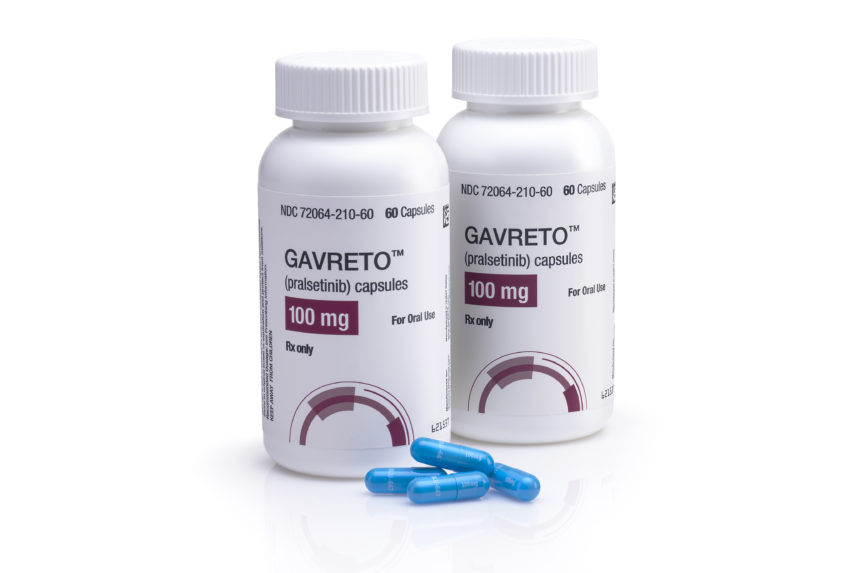Cabometyx (cabozantinib) vs Gavreto (pralsetinib)
Cabometyx (cabozantinib) vs Gavreto (pralsetinib)
Cabometyx (cabozantinib) is a tyrosine kinase inhibitor that is approved for the treatment of advanced renal cell carcinoma, previously treated advanced hepatocellular carcinoma, and medullary thyroid cancer, working by targeting multiple tyrosine kinases which can contribute to tumor growth, angiogenesis, and metastatic progression. Gavreto (pralsetinib) is also a tyrosine kinase inhibitor but is specifically designed to target RET mutations and fusions, and is approved for the treatment of adults with metastatic RET fusion-positive non-small cell lung cancer (NSCLC), advanced or metastatic RET-mutant medullary thyroid cancer, and advanced RET fusion-positive thyroid cancer. When deciding between the two, it is essential to consider the specific type of cancer and its genetic profile, as Gavreto is tailored for cancers with RET alterations, while Cabometyx has a broader application but may not be as targeted for RET-driven cancers.
Difference between Cabometyx and Gavreto
| Metric | Cabometyx (cabozantinib) | Gavreto (pralsetinib) |
|---|---|---|
| Generic name | Cabozantinib | Pralsetinib |
| Indications | Advanced renal cell carcinoma, hepatocellular carcinoma, medullary thyroid cancer | Advanced or metastatic RET fusion-positive non-small cell lung cancer, advanced or metastatic RET-mutant medullary thyroid cancer, and advanced RET fusion-positive thyroid cancer |
| Mechanism of action | Tyrosine kinase inhibitor that targets MET, VEGFR, and AXL | Tyrosine kinase inhibitor that selectively targets RET fusions and mutations |
| Brand names | Cabometyx | Gavreto |
| Administrative route | Oral | Oral |
| Side effects | Diarrhea, fatigue, nausea, decreased appetite, hypertension, etc. | Fatigue, constipation, musculoskeletal pain, hypertension, etc. |
| Contraindications | Hypersensitivity to cabozantinib or any component of the formulation | Hypersensitivity to pralsetinib or any component of the formulation |
| Drug class | Tyrosine kinase inhibitor | Tyrosine kinase inhibitor |
| Manufacturer | Exelixis, Inc. | Blueprint Medicines Corporation |
Efficacy
Cabometyx (Cabozantinib) for Thyroid Cancer
Cabometyx, the brand name for cabozantinib, is a medication that has shown efficacy in treating certain types of thyroid cancer. Specifically, it has been approved for patients with progressive, metastatic medullary thyroid cancer (MTC). The efficacy of Cabometyx in this context is based on its ability to inhibit multiple tyrosine kinases, which are involved in both tumor growth and angiogenesis. Clinical trials have demonstrated that cabozantinib can lead to significant reductions in tumor size and has the potential to slow the progression of the disease in some patients. However, it is important to note that the response to the drug can vary, and not all patients with medullary thyroid cancer will respond to treatment with Cabometyx.
Gavreto (Pralsetinib) for Thyroid Cancer
Gavreto, known generically as pralsetinib, is another targeted therapy that has been found to be effective in the treatment of thyroid cancer. It is particularly indicated for the treatment of adult and pediatric patients 12 years of age and older with advanced or metastatic RET-mutant medullary thyroid cancer who require systemic therapy. Pralsetinib targets the RET kinase, which plays a critical role in the development of certain thyroid cancers. Clinical trials have shown that Gavreto can achieve significant response rates in patients with RET-mutant medullary thyroid cancer, including those who have previously been treated with other systemic therapies.
Comparative Efficacy in Thyroid Cancer Treatment
When comparing the efficacy of Cabometyx and Gavreto in thyroid cancer treatment, it is essential to consider the specific genetic mutations present in the tumor. Cabozantinib has a broader target profile and may be used in cases where the specific driver mutations are not well-defined or when there are multiple pathways involved in tumor progression. On the other hand, pralsetinib is highly selective for RET mutations and is most effective in patients whose tumors harbor these specific genetic alterations. The choice between these medications would typically depend on the molecular profile of the tumor, the patient's overall health status, and previous treatments.
Conclusion on Efficacy
In conclusion, both Cabometyx and Gavreto have shown efficacy in the treatment of certain types of thyroid cancer, with their use being contingent upon the genetic characteristics of the cancer. The efficacy of these drugs highlights the importance of molecular testing in guiding treatment decisions for thyroid cancer. As with all cancer treatments, the efficacy must be weighed against potential side effects, and the treatment choice should be personalized to the patient's specific clinical situation. It is recommended that patients discuss the potential benefits and risks of these medications with their healthcare provider.
Regulatory Agency Approvals
Cabometyx
-
European Medical Agency (EMA), European Union

-
Food and Drug Administration (FDA), USA

-
Health Canada

-
Therapeutic Goods Administration (TGA), Australia

Gavreto
-
European Medical Agency (EMA), European Union

-
Food and Drug Administration (FDA), USA

Access Cabometyx or Gavreto today
If Cabometyx or Gavreto are not approved or available in your country (e.g. due to supply issues), you can access them via Everyone.org.
How it works

Make an enquiry
Choose the medicine you want to buy, answer a couple of questions, and upload your prescription to speed things up. We’ll get back to you within 24 hours.


Make an enquiry
Choose the medicine you want to buy, answer a couple of questions, and upload your prescription to speed things up. We’ll get back to you within 24 hours.


Breeze through the paperwork
We'll guide you through the required documents for importing unapproved medicine, ensuring you have all the necessary information.


Get a personalized quote
We’ll prepare a quote for you, including medicine costs and any shipping, administrative, or import fees that may apply.


Receive your medicine
Accept the quote and we’ll handle the rest - sourcing and safely delivering your medicine.

Some text on this page has been automatically generated. Speak to your physician before you start a new treatment or medication.
Let's talk
If you have any questions, call us or send us a message through WhatsApp or email:
Contact us




